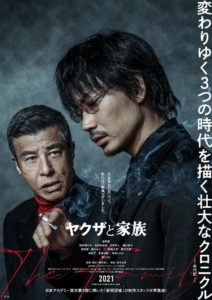AKA: Yakuza and the Family
Director: Michihito Fujii
Cast: Go Ayano, Hiroshi Tachi, Machiko Ono, Yukiya Kitamura, Hayato Ichihara, Hayato Isomura, Shun Sugata, Suon Kan, Ryutaro Ninomiya, Taro Suruga
Running Time: 135 min.
By Henry McKeand
“Lately, I’m getting the feeling that I came in at the end. The best is over.”
It’s been nearly twenty-five years since Tony Soprano, perhaps America’s last real mafia icon, said these words in the pilot episode of The Sopranos. For at least three decades, crime films (or at least their protagonists) have bemoaned the fact that being a mobster isn’t what it used to be, but that hasn’t done anything to control audiences’ appetite for underworld stories. This puts crime filmmakers in a tough position: they can either look back to the mid-20th-century, when organized crime was at the height of its powers, or try to tell a topical crime story that reckons with the decline of traditional gangster subcultures.
Japan cinema has been dealing with this dilemma for years. Cultural changes and legal crackdowns have led to decreasing numbers of Japanese Yakuza, who have been staples of cinematic gangsterdom since the 70s. Some films, such as Takeshi Kitano’s Outrage trilogy, have tackled this steady fall. Sure, Kitano served up the requisite bloodshed and backstabbing, but his Yakuza characters, with their severed pinkies and feudal mindsets, seemed out of place in the modern world, their ceaseless violence the death throes of a shrinking caste.
If Kitano was subtly commenting on these changes, Michihito Fujii faces them head-on with A Family, his underseen 2020 film about Yakuza clashing with a new Japan that wants nothing to do with them. It presents a world where Yakuza are rendered weak and desperate in the 21st century, and the film’s most devastating scenes center on the mental anguish that comes when someone’s way of life disappears.
At over two hours, it tells an epic story spanning twenty years in a Yakuza family. A young man named Kenji (Go Ayano) lives an aimless life of petty crime until he meets Shibasaki (Hiroshi Tachi), a Yakuza boss with an old-school moral code. As he goes deeper into the Yakuza lifestyle, Kenji begins to look at Shibasaki as a father figure. Things are good for a while, especially when he forms a connection with a student and part-time hostess named Yukiko (Machiko Ono), but dangerous rivals and a rapidly changing world threaten to tear everything apart.
The first hour tells a story you’ve seen before. Kenji rises through the ranks, finds purpose in his criminal family, and meets a woman who shows him what a “normal” life could be. This more formulaic half won’t be a problem for anyone jonesing for a good modern Yakuza drama. It’s well-shot and confidently directed, and the “period piece” segments, taking place in 1999 and 2005, are stylish and effective without relying on nostalgic imagery. The performances are all fantastic, with Hiroshi Tachi’s turn as the Yakuza patriarch especially impressive. Most importantly, the gangster politics are interesting, and everything comes to a satisfying mid-point showdown.
The film deviates from genre expectations when the plot jumps forward to 2019. With time, the tight-knit brotherhood of Yakuza has become a glorified street gang. To make ends meet, they resort to petty schemes and risky narcotics deals. There are no grand shootouts or standoffs now, and there’s a mournful quality to every scene. Genre fans may be disappointed at the lack of fireworks, but this is where Fujii mines the film’s true pathos.
For better or worse, A Family has an almost unprecedented focus on the sad realities of modern Yakuza life. It’s especially interested in what it means to be ex-Yakuza in an unaccepting society. In the film’s world, finding jobs and supporting a family with the stigma of being a former Yakuza is a painful and often humiliating experience. Because of this, some characters end up clinging onto their Yakuza identities even as it destroys them. To them, it’s the only way that they can be treated with respect or humanity.
It’s an interesting subject to explore, but Fujii comes dangerously close to steering into “message movie” territory. Scene after scene, characters cry and mourn the lives they once knew as the soundtrack swells. It begins to feel a little too emotionally manipulative, even in undeniably powerful scenes of aging Yakuza longing for acceptance.
In the world of A Family, the Yakuza are underdogs merely trying to hold onto centuries-old values of brotherhood and honor, and the main characters are shown mostly well-intentioned. Tachi’s gentle crime boss character is treated by both the characters and the script as a kind old man who simply wants the best for his family.
In some ways, this is a strongpoint of the film. From Fukasaku to Miike, many classic Japanese crime films have pointed out moral rot and hypocrisy in the would-be-Samurai codes of the Yakuza, but Fujii more or less takes his characters at face value. The best crime stories get you to empathize with its outlaws, and simple moral condemnation is rarely interesting. Still, it’s hard not to wonder what the film could be if it did more to acknowledge that even the halcyon days of the Yakuza were full of violence and exploitation. This could have added moral nuance to characters that here read as pitiful victims of changing times.
Even with its sometimes overly-sentimental view of its gangster protagonists, A Family presents a fresh look its subject matter. Fujii proves in early scenes that he can deliver down-and-dirty crime thrills, but the eventual shift to broader themes of forgiveness and reformation is refreshing and ultimately worthwhile.
Henry McKeand’s Rating: 7/10



